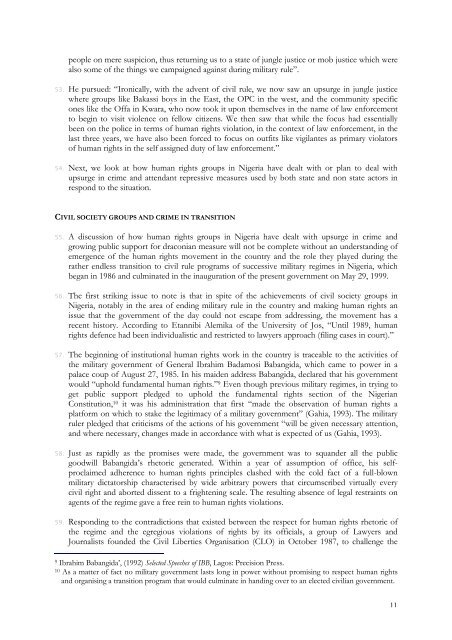114 - Nigeria - Crime and Human Rights Shettima, Kole - The ICHRP
114 - Nigeria - Crime and Human Rights Shettima, Kole - The ICHRP
114 - Nigeria - Crime and Human Rights Shettima, Kole - The ICHRP
Create successful ePaper yourself
Turn your PDF publications into a flip-book with our unique Google optimized e-Paper software.
people on mere suspicion, thus returning us to a state of jungle justice or mob justice which were<br />
also some of the things we campaigned against during military rule”.<br />
53. He pursued: “Ironically, with the advent of civil rule, we now saw an upsurge in jungle justice<br />
where groups like Bakassi boys in the East, the OPC in the west, <strong>and</strong> the community specific<br />
ones like the Offa in Kwara, who now took it upon themselves in the name of law enforcement<br />
to begin to visit violence on fellow citizens. We then saw that while the focus had essentially<br />
been on the police in terms of human rights violation, in the context of law enforcement, in the<br />
last three years, we have also been forced to focus on outfits like vigilantes as primary violators<br />
of human rights in the self assigned duty of law enforcement.”<br />
54. Next, we look at how human rights groups in <strong>Nigeria</strong> have dealt with or plan to deal with<br />
upsurge in crime <strong>and</strong> attendant repressive measures used by both state <strong>and</strong> non state actors in<br />
respond to the situation.<br />
CIVIL SOCIETY GROUPS AND CRIME IN TRANSITION<br />
55. A discussion of how human rights groups in <strong>Nigeria</strong> have dealt with upsurge in crime <strong>and</strong><br />
growing public support for draconian measure will not be complete without an underst<strong>and</strong>ing of<br />
emergence of the human rights movement in the country <strong>and</strong> the role they played during the<br />
rather endless transition to civil rule programs of successive military regimes in <strong>Nigeria</strong>, which<br />
began in 1986 <strong>and</strong> culminated in the inauguration of the present government on May 29, 1999.<br />
56. <strong>The</strong> first striking issue to note is that in spite of the achievements of civil society groups in<br />
<strong>Nigeria</strong>, notably in the area of ending military rule in the country <strong>and</strong> making human rights an<br />
issue that the government of the day could not escape from addressing, the movement has a<br />
recent history. According to Etannibi Alemika of the University of Jos, “Until 1989, human<br />
rights defence had been individualistic <strong>and</strong> restricted to lawyers approach (filing cases in court).”<br />
57. <strong>The</strong> beginning of institutional human rights work in the country is traceable to the activities of<br />
the military government of General Ibrahim Badamosi Babangida, which came to power in a<br />
palace coup of August 27, 1985. In his maiden address Babangida, declared that his government<br />
would “uphold fundamental human rights.” 9 Even though previous military regimes, in trying to<br />
get public support pledged to uphold the fundamental rights section of the <strong>Nigeria</strong>n<br />
Constitution, 10 it was his administration that first “made the observation of human rights a<br />
platform on which to stake the legitimacy of a military government” (Gahia, 1993). <strong>The</strong> military<br />
ruler pledged that criticisms of the actions of his government “will be given necessary attention,<br />
<strong>and</strong> where necessary, changes made in accordance with what is expected of us (Gahia, 1993).<br />
58. Just as rapidly as the promises were made, the government was to squ<strong>and</strong>er all the public<br />
goodwill Babangida’s rhetoric generated. Within a year of assumption of office, his selfproclaimed<br />
adherence to human rights principles clashed with the cold fact of a full-blown<br />
military dictatorship characterised by wide arbitrary powers that circumscribed virtually every<br />
civil right <strong>and</strong> aborted dissent to a frightening scale. <strong>The</strong> resulting absence of legal restraints on<br />
agents of the regime gave a free rein to human rights violations.<br />
59. Responding to the contradictions that existed between the respect for human rights rhetoric of<br />
the regime <strong>and</strong> the egregious violations of rights by its officials, a group of Lawyers <strong>and</strong><br />
Journalists founded the Civil Liberties Organisation (CLO) in October 1987, to challenge the<br />
9 Ibrahim Babangida’, (1992) Selected Speeches of IBB, Lagos: Precision Press.<br />
10 As a matter of fact no military government lasts long in power without promising to respect human rights<br />
<strong>and</strong> organising a transition program that would culminate in h<strong>and</strong>ing over to an elected civilian government.<br />
11
















